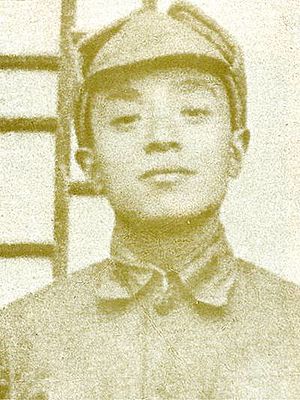Yang Shangkun facts for kids
Quick facts for kids
Yang Shangkun
|
|
|---|---|
| 杨尚昆 | |
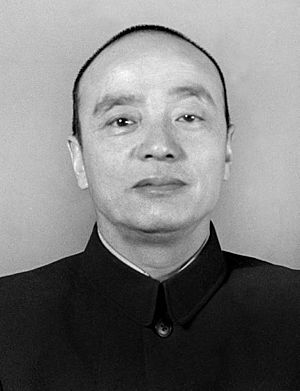 |
|
| 4th President of the People's Republic of China | |
| In office 9 April 1988 – 27 March 1993 |
|
| Premier | Li Peng |
| Vice President | Wang Zhen |
| Leader | Deng Xiaoping |
| Preceded by | Li Xiannian |
| Succeeded by | Jiang Zemin |
| Secretary-General of the CCP Central Military Commission | |
| In office August 1945 – November 1956 |
|
| Succeeded by | Huang Kecheng |
| In office July 1981 – November 1989 |
|
| Preceded by | Geng Biao |
| Succeeded by | Yang Baibing |
| Member of the National People's Congress |
|
| In office 21 December 1964 – 13 January 1975 |
|
| Constituency | PLA At-large |
| In office 25 March 1988 – 15 March 1993 |
|
| Constituency | Sichuan At-large |
| 7th Mayor of Guangzhou | |
| In office 1979–1981 |
|
| Preceded by | Jiao Linyi |
| Succeeded by | Liang Lingguang |
| Personal details | |
| Born | 3 August 1907 Tongnan, Chongqing, Sichuan, Qing Empire |
| Died | 14 September 1998 (aged 91) Beijing, People's Republic of China |
| Nationality | Chinese |
| Political party | Chinese Communist Party (1926–1993) |
| Spouses |
Li Bozhao
(m. 1929; her death 1985) |
| Children | 3 |
| Alma mater | Shanghai University, Moscow Sun Yat-sen University |
| Yang Shangkun | |||||||
|---|---|---|---|---|---|---|---|
| Simplified Chinese | 杨尚昆 | ||||||
| Traditional Chinese | 楊尚昆 | ||||||
|
|||||||
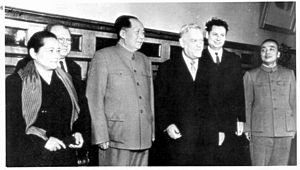
Yang Shangkun (born August 3, 1907 – died September 14, 1998) was an important leader in China's Communist Party and military. He served as the President of the People's Republic of China from 1988 to 1993. After Mao Zedong died, Yang was one of the powerful older leaders who guided the party.
Yang came from a well-off family that owned land. He studied politics at Shanghai University. He also learned about ideas for changing society at Moscow Sun Yat-sen University in the Soviet Union. Yang held high positions under both Mao Zedong and later Deng Xiaoping. From 1945 to 1965, he managed the daily operations of the government and the Communist Party. He also oversaw military matters. This gave him a lot of influence over documents, records, and money.
During a difficult time called the Cultural Revolution, Yang was removed from his job, arrested, and put in prison for 12 years. However, he returned to power in 1978. He became a close friend and supporter of Deng Xiaoping. Yang served as the Mayor of Guangzhou from 1979 to 1981. He also returned to a top military role, helping to lead the PLA. Later, he became President.
Yang was one of the first to support changes to China's economy. He believed these changes were similar to ideas from a past leader, Vladimir Lenin. However, Yang did not want big changes to how the government was run. He also defended Mao Zedong, even though he suffered during the Cultural Revolution. Yang and his half-brother, General Yang Baibing, largely controlled the PLA throughout the 1980s and early 1990s.
Yang played a key role in handling the Tiananmen Square protests in 1989. He helped plan and supervise the operations to clear the square. In 1993, Yang tried to keep control of the PLA and challenge the new leader, Jiang Zemin. But other older party leaders, including Deng, made him retire.
Contents
Early Life and Political Start
Yang was born into a land-owning family in Tongnan County, near Chongqing in Sichuan. He went to school in Chengdu from 1920 to 1925. His older brother, Yang Yingong, was one of the first members of the Chinese Communist Party in Sichuan. His brother's ideas influenced Yang Shangkun.
Yang joined the Communist Youth League in 1925 and the Communist Party in 1926. He then studied politics at Shanghai University. In 1927, Yang went to the Soviet Union. There, he studied ideas about how society should work and ways to organize people for change at the Moscow Sun Yat-sen University.
Yang was part of a group of Chinese students who studied in Moscow. They later became important leaders in the Communist Party. This group was known as the 28 Bolsheviks. Yang returned to China in 1931 and began his military career. He worked in the Chinese Red Army, helping to lead its political work in different battle areas. In 1934, he became a political leader for the 3rd Red Army.
War Years and Party Work
During the Second Sino–Japanese War, Yang Shangkun worked with Liu Shaoqi behind Japanese lines. In 1939, he became a key leader in North China. He worked with military leaders like Zhu De and Peng Dehuai to support the Eighth Route Army's operations. This included a major battle called the Hundred Regiments Campaign.
In 1941, Yang returned to Yan'an and became a personal helper to Mao Zedong. In 1945, he took charge of the Party's main office and became the Secretary-General of the Central Military Commission, which Mao led. In these roles, Yang managed much of the Party's daily military and political work. He did this very successfully.
During the Chinese Civil War in 1949, Yang was in charge of the "Central Security Force." This group protected the Party's main leaders. His work in these roles was very important to the Communist victory. It also helped in the creation of the People's Republic of China in 1949.
Role in the People's Republic
After the People's Republic of China was founded in October 1949, Yang Shangkun worked very closely with Mao Zedong every day. He was one of the few leaders to do so. As the Director of the General Office and Secretary-General of the CMC, he managed most of the daily work for the Party and military.
However, before the Cultural Revolution began in 1966, Yang was seen as a supporter of other leaders like Liu Shaoqi and Deng Xiaoping. He was then removed from the Communist Party and all his jobs. He was accused of being a "counter-revolutionary." Yang was also treated badly by groups called Red Guards. They wrongly accused him of secretly listening in on Mao.
Yang stayed in prison until Mao died and Deng Xiaoping came to power in 1978. Deng brought Yang back into the government and made him a general. Deng asked Yang to help make China's army better. Deng believed the army was too big and did too many non-military things. Yang was given a high position in the Central Military Commission to help him make these changes. In 1982, Yang also became a full member of the Politburo, a top decision-making group.
Yang was a close friend of Deng and agreed with many of Deng's goals for the economy. But he was less keen on political changes that other leaders wanted. Yang supported economic changes by referring to ideas from Vladimir Lenin. He believed the Communist Party should still control the economy, even private businesses. He also always defended Mao Zedong as a great leader, despite his own suffering during the Cultural Revolution.
In the early 1980s, Yang supported an American historian named Harrison Salisbury. Salisbury wanted to write a book about the Long March by talking to people who were there. The book, Long March: The Untold Story, was praised for its first-hand accounts.
Presidency and Later Years
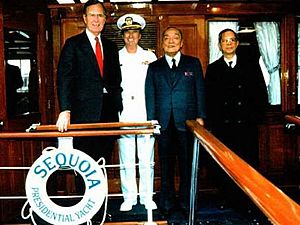
In 1988, Yang became the President of the People's Republic of China. This role was mostly symbolic, meaning it had little real power. The main power was held by the Communist Party's General Secretary and the Premier. However, leaders still looked to Deng Xiaoping for guidance.
Yang's role during the Tiananmen protests of 1989 was very important. At first, Yang seemed to support the students and agreed with General Secretary Zhao Ziyang's ideas for handling the situation peacefully. But other leaders, like Premier Li Peng, wanted to use force.
After the leaders who wanted to use force gained more power, Yang changed his mind. He then supported using force to stop the protests. In May 1989, Yang appeared on TV. He called the student protests "anarchy" and supported putting martial law in place in parts of Beijing. Yang then helped organize and plan the actions to clear the square.
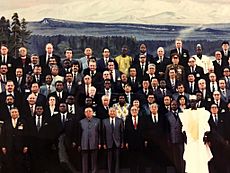
Throughout the 1980s and early 1990s, Yang Shangkun was very powerful in the People's Liberation Army. Yang and his younger half-brother, Yang Baibing, removed military officers who had not fully supported the government's actions against the students. Yang then tried to put his own supporters into many senior military jobs. This made other military leaders upset. They accused Yang of trying to control the army and possibly challenge Deng's authority.
When Yang did not support Jiang Zemin, whom Deng wanted to be the next top leader, other older party leaders, including Deng himself, made Yang retire in 1993. Some of his family members also had to retire.
Yang died on September 14, 1998, at the age of 91. His official obituary described him as "a great revolutionary, a statesman, a military strategist, a strong Marxist, an outstanding leader of the party, the state, and the people's army."
Personal Life
In 1929, Yang married Li Bozhao. She also took part in the Long March with him. They had three sons.
See also
 In Spanish: Yang Shangkun para niños
In Spanish: Yang Shangkun para niños
- Politics of the People's Republic of China
 | Anna J. Cooper |
 | Mary McLeod Bethune |
 | Lillie Mae Bradford |


